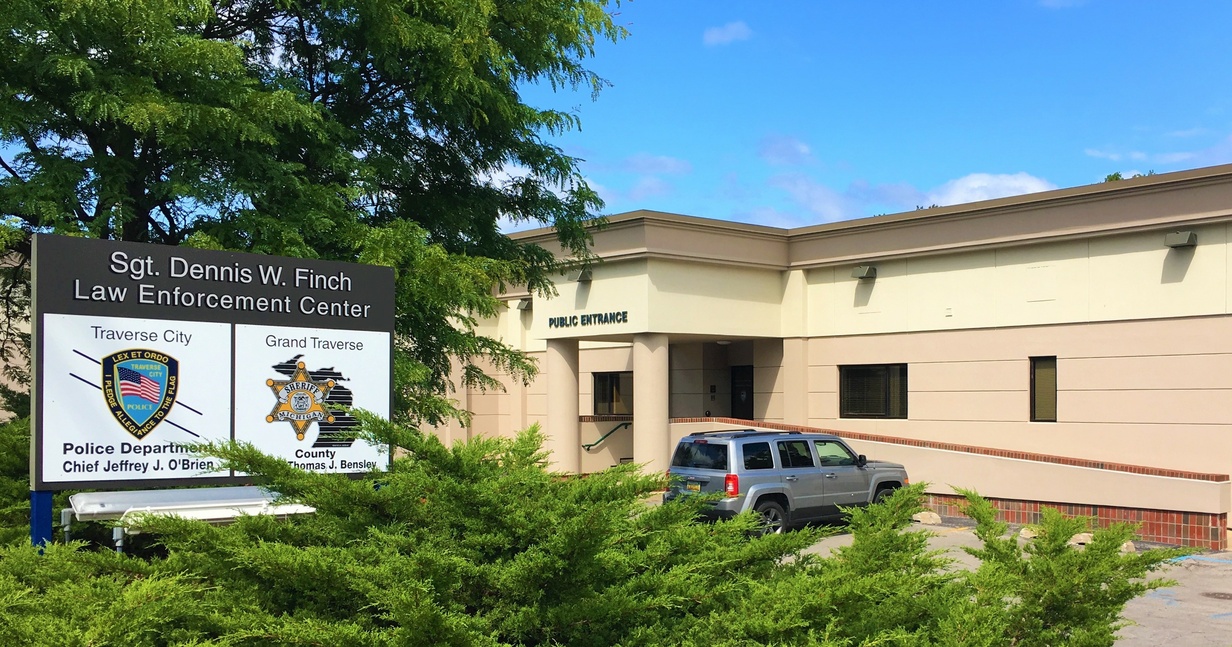
TCPD Ramps Up Community Policing Efforts With Public Advisory Board, Overdose Quick Response Team, Mental Health Focus
By Beth Milligan | March 11, 2022
In the wake of controversial cases like the George Floyd murder in Minnesota, national debate about police reform, and an increased focus on mental health and substance abuse issues, the Traverse City Police Department is ramping up efforts to implement “community policing” programs in 2022, according to TCPD Chief Jeff O’Brien. In a presentation to city commissioners this week, O’Brien said the department's emphasis has shifted from being “a law and order-type agency to more of a peacekeeping agency,” a move that includes establishing a community advisory board with representation from marginalized communities, creating a quick response team to respond to overdose cases with treatment instead of jail, and offering mental healthcare support to both residents and officers.
TCPD Captain Keith Gillis said community policing – which he defined as “looking at the big picture and solving problems rather than just making an arrest and taking somebody to jail” – has been a “buzzword” concept for years. However, while many law enforcement agencies talk the talk when it comes to community policing, not all of them walk the walk, Gillis said.
“A lot of departments throughout the country, they talk about community policing, talk about community policing, but how many of them actually implement programs that are community policing-related?” he asked commissioners. “Our department has taken a strong proactive approach to implement diversionary programs versus taking somebody to jail.”
Two TCPD initiatives in 2022 are designed to assist that effort. City Manager Marty Colburn said the city is “very close now” to launching a community policing advisory board, a group of resident representatives who would regularly meet with the TCPD and provide input on department policies and decisions. While the exact makeup of the board and the process for selecting members is still being finalized, O’Brien tells The Ticker the goal is to include a broad spectrum of representation from community groups to have a “two-way discussion” with officers about areas of concern and opportunities for improvement.
“The LGBTQ community, BIPOC/Native American representation, veterans groups, neighborhood groups, senior citizens,” O’Brien cites as examples of members that could be on the board. “We’ve discussed the possibility of having a police chaplain or representation for religious diversity, to have someone from the Christian or Jewish or Muslim faiths. We want to make sure these groups have a say and give input on how the TCPD is interacting with them.”
O’Brien says the board could help the department proactively address potential issues, as well as weigh in on impactful decisions when they arise. He cites the recent controversial purchase of an armored vehicle by the Grand Traverse Sheriff’s Office as an example of an issue the advisory board would have a voice on in the city. “If we ever got to a position that we had to have some type of paramilitary equipment in this city, that discussion…long before we ever brought it to you, it would be with the citizens in the community,” O’Brien told commissioners. “I think that’s really important.”
Another TCPD initiative will see the department either hire or contract with a social worker this year to be part of a quick response team (QRT), a multi-disciplinary team that would respond to overdose cases. TCPD has been approved for a three-year grant for just over $200,000 through the Michigan State Police for the program, and Colburn indicated additional funds could be committed by the city in its upcoming 2022-23 budget. O’Brien says that when TCPD responds to an overdose now, “there’s really no follow-up” once officers leave the scene. An individual may be hospitalized, or could face jail time if illegal drugs are involved, but they're otherwise often on their own after the incident. With a QRT, a social worker and health professional would respond with an officer to an overdose scene and connect the victim to treatment services and support.
“We know that when an individual overdoses, there’s a 24-hour period that they’re really sick and they really need help,” O’Brien told commissioners. “Instead of them going and buying, we’re trying to get them fast-tracked into some type of diversionary support.” O’Brien said TCPD was looking to work with a variety of community groups, from the courts to the library to Munson Medical Center to Safe Harbor, to collaboratively offer “long-term solutions” for addressing substance and opioid abuse issues. Gillis said that jailing individuals with addiction only worsens the problem, as individuals will often go through withdrawal and then seek out drugs when they’re released, putting them at risk of overdosing because their tolerance levels changed in jail. Community policing is about “understanding their addiction and getting them the assistance that they actually need,” Gillis said.
Other TCPD efforts are underway to improve community outreach and relations. O’Brien says the recent deployment of body cameras has been embraced by both officers and the public. “It’s a great tool,” he says. “It’s really part of policing in our time.” Gillis told commissioners the TCPD has also worked to build relationships with individuals experiencing homelessness, so that officers can connect those individuals with mental healthcare and other resources as needed. “Taking them to jail is not going to solve the problem,” he said. Biased-based and de-escalation training, along with having a specialized TCPD crisis intervention team trained to respond to high-tension scenes where mental health issues may be in play, is also part of the department’s playbook.
Treating mental health issues – a trend O’Brien and Gillis both agree is likely to continue dominating law enforcement strategy – is important not just for residents but officers. TCPD now offers a peer-to-peer support program for officers struggling with stress and PTSD from the job. Gillis said the “pressure of being a police officer in today’s day and age” is significantly different from when he started three decades ago, adding that departments like TCPD are learning to respond accordingly. “Back in the day, you would brush (the stress) off,” Gillis said. “You wouldn’t say anything because you just didn’t want to seem like you were weak. Well, that’s not the case. We need to talk, our guys need to talk. The chief implemented this program to give our officers an opportunity to communicate on things they’re dealing with.”
Comment






